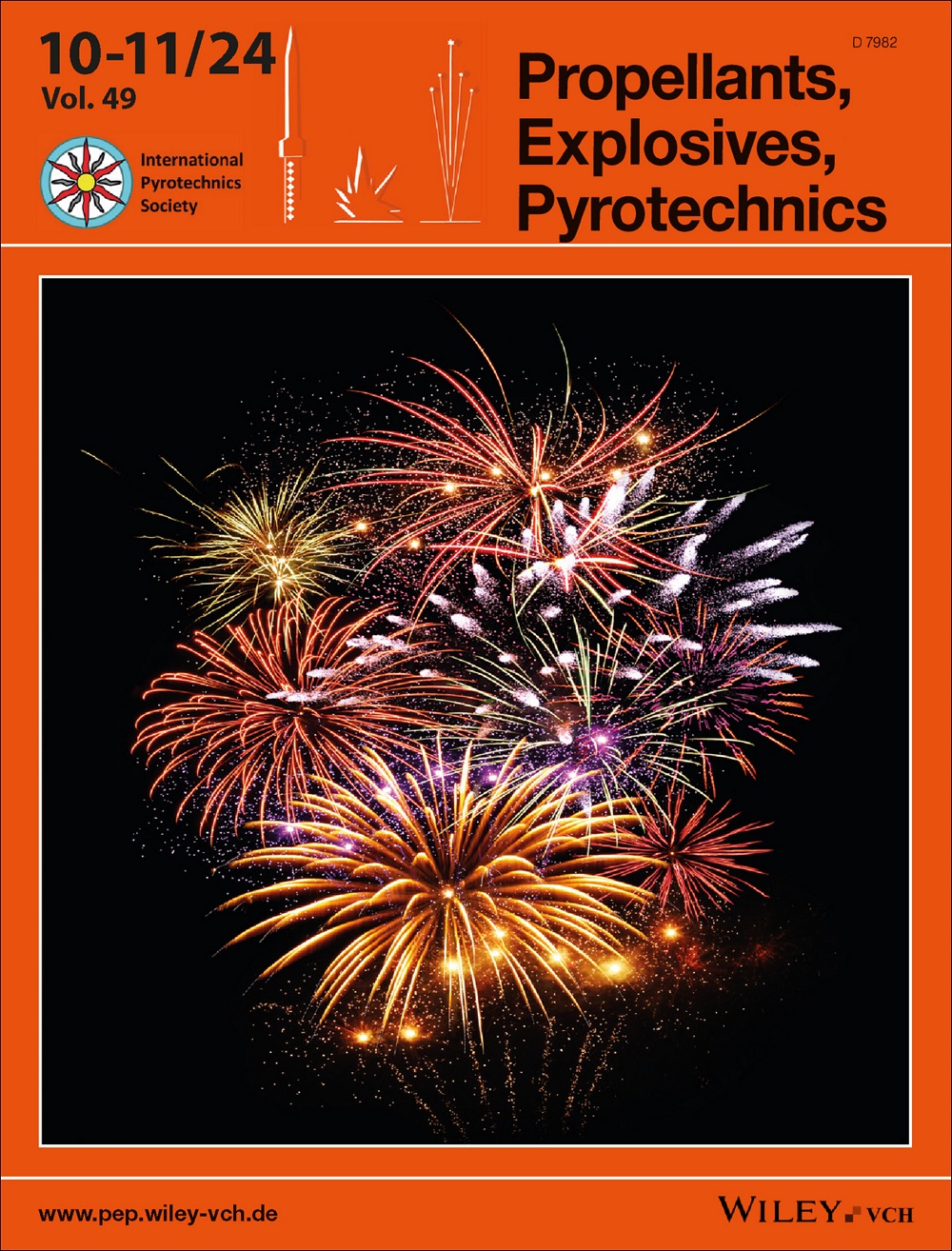区分反应材料化学能和动能的方法:聚四氟乙烯/六氟化硫作为聚四氟乙烯/铝的惰性替代品
IF 2
4区 工程技术
Q3 CHEMISTRY, APPLIED
引用次数: 0
摘要
为了区分聚四氟乙烯/铝在冲击中的动力学和化学贡献,本研究探讨了通过用惰性材料替代铝(Al)来引入聚四氟乙烯/铝的惰性替代品的可行性。通过原材料的混合、压缩和烧结过程制作了三个试样,并对这些试样的机械性能进行了评估。对 PTFE/Al 和 PTFE/LiF 试样进行了动态破碎试验。这些结果进一步证实了 PTFE/LiF 作为 PTFE/Al 的惰性替代品的潜力,两种材料表现出相似的破碎分布特性。通过通风室量热学测试对两种材料的能量释放进行了初步探索。研究结果表明,在大约 650 米/秒的冲击速度下,只有 66.9% 的材料沉积在腔体内,只有 17.8% 的材料被激发,沉积总能量的约 88.9% 来自 PTFE/Al 材料内部的化学反应能量。重要的是,这种方法有望进一步应用于各种聚四氟乙烯/铝基反应材料的能量释放分析实验。这些发现有利于评估反应碎片在典型目标上的能量释放特性,并为在未来研究中完善此类材料的能量释放模型奠定了基础。本文章由计算机程序翻译,如有差异,请以英文原文为准。
An approach to distinguish chemical and kinetic energy of reactive materials: PTFE/LiF as an inert substitute to PTFE/Al
To distinguish between the kinetic and chemical contributions in the impact of PTFE/Al, this study explores the feasibility of introducing an inert substitute for PTFE/Al by substituting aluminum (Al) with inert materials. Three specimens were fabricated through a process involving mixing, compression, and sintering of raw materials The mechanical properties of these specimens were assessed. Dynamic fragmentation tests of PTFE/Al and PTFE/LiF specimens were performed. These results further substantiate the potential of PTFE/LiF as an inert alternative to PTFE/Al, the two materials exhibit comparable fragmentation distribution characteristics. A preliminary exploration of the energy release in both materials was conducted via vented chamber calorimetry tests. The findings reveal that, at an impact velocity of roughly 650 m/s, only 66.9 % of the materials were deposited into the chamber, with a mere 17.8 % being initiated, about 88.9 % of the total deposited energy results from the chemical reaction energy within the PTFE/Al materials. Importantly, this method demonstrates promise for further application in energy release analysis experiments for various PTFE/Al‐based reactive materials. These findings are beneficial for evaluating the energy release characteristics of reactive fragments on typical targets and lay the foundation for refining energy release models of such materials in future research.
求助全文
通过发布文献求助,成功后即可免费获取论文全文。
去求助
来源期刊

Propellants, Explosives, Pyrotechnics
工程技术-工程:化工
CiteScore
4.20
自引率
16.70%
发文量
235
审稿时长
2.7 months
期刊介绍:
Propellants, Explosives, Pyrotechnics (PEP) is an international, peer-reviewed journal containing Full Papers, Short Communications, critical Reviews, as well as details of forthcoming meetings and book reviews concerned with the research, development and production in relation to propellants, explosives, and pyrotechnics for all applications. Being the official journal of the International Pyrotechnics Society, PEP is a vital medium and the state-of-the-art forum for the exchange of science and technology in energetic materials. PEP is published 12 times a year.
PEP is devoted to advancing the science, technology and engineering elements in the storage and manipulation of chemical energy, specifically in propellants, explosives and pyrotechnics. Articles should provide scientific context, articulate impact, and be generally applicable to the energetic materials and wider scientific community. PEP is not a defense journal and does not feature the weaponization of materials and related systems or include information that would aid in the development or utilization of improvised explosive systems, e.g., synthesis routes to terrorist explosives.
 求助内容:
求助内容: 应助结果提醒方式:
应助结果提醒方式:


